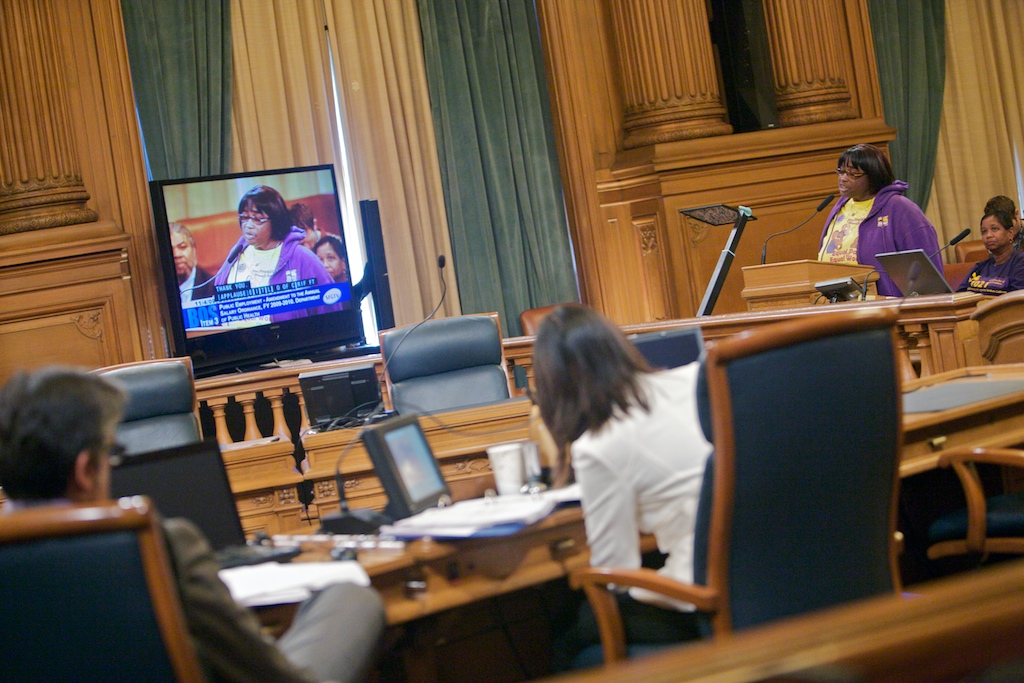San Francisco city leaders have found an extra pot of $8 million they hope to use as a patch on the summer’s tattered budget, potentially rescuing more than 500 frontline workers already given pink slips or downgraded to lower-paying jobs.
The city employees, mostly nursing assistants and clerical workers, were given 60 days’ notice in September after a bitter conflict with the organized labor, provoking accusations that the city was discriminating against women and minority employees, who are well represented in those professions.
On Wednesday, the Board of Supervisors’ budget committee moved forward with two pieces of legislation that would hand a victory to SEIU 1021, a major labor union that represents nearly all of the 546 city workers threatened with layoffs this fall.
Supervisors Chris Daly and John Avalos authored the two proposals. Avalos’ legislation would save the health-care and clerical workers’ jobs by scaling back management positions.
Daly’s plan is to use $7 million from the city’s general fund to prevent the layoffs. The Department of Public Health is projecting a surplus of $8.25 million for its fourth quarter. Daly’s legislation would, effectively, dip into these funds.
While the full board will consider both ideas in the next few weeks, there is the chance the jobs could be saved through other approaches.
“The mayor’s office is continuing discussions with the union,” Avalos said. Avalos also said he hopes the city could find new revenue from the state.
Race, gender and class at issue
Dozens of workers and their supporters spoke at Wednesday’s committee meeting. Madeline McMillian is a clerk at the Hall of Justice. While she did not receive a pink slip, she came to speak on behalf of coworkers who were laid off. She said the cuts were unfair.
“It’s just not right,” McMillian said. “They should cut straight across. I work at the Hall of Justice. They just hired two deputy chiefs. Their income could cover five of us.”
The layoffs are a heavily debated political issue. The union has decried the cuts and criticized Mayor Gavin Newsom for balancing the budget on the backs of low-income workers.
Newsom’s aides say San Francisco nursing assistants are better compensated than those in comparable cities in California. The city, facing a $438 million budget hole, had to make tough decisions, Newsom said.
The union says the layoffs disproportionately hurt women and minority workers.
“Eighty-two percent of the city layoffs over the course of the last three years have been SEIU members,” said Robert Haaland, a political organizer for SEIU 1021. “We only represent 50 percent of the workers.”
Debating the numbers
The controller’s office could not confirm Haaland’s statistics.
“Layoffs are not necessarily evenly distributed among unions,” Deputy Controller Monique Zmuda wrote in an e-mail.
Zmuda said many factors influence layoff decisions, including “the value of wage concessions, priority of services and ability to reduce costs while maintaining service delivery.”
Supervisor Carmen Chu was the only member of the budget and finance committee to vote no. She said it was important to evaluate the impacts of the legislation, specifically how many jobs it would save and how many new managerial jobs would be lost.
But another supporter of the change, Supervisor David Campos said the attention on the issue represents unfinished business from the summertime cuts.
“People are so passionate about this issue is because it is so important,” Campos said.







